(The opinions in this article are opinions of the writer and may -- or may not -- represent the views of Interfaith Winston-Salem. It is written by Alan Williams, IFWS board member and professor of history at Wake Forest University.) _______________________
On Faith
I do not see myself as a person of faith, I don’t belong to any faith community, and even the word faith itself makes me uncomfortable. Yet I am a member of an organization in whose name this word figures prominently, Interfaith Winston Salem. What am I doing collaborating in a project founded on ways of approaching the world I do not share? One answer is that I admire the people I’ve met in this organization; but still, is there anything about this thing called faith I can honestly say I share with my religious friends? If so, perhaps it can be found in the answers three prominent variants of religion give to one or more of the following questions about faith: What is it? Does it enhance our lives? Can it be acquired, and, if so, how? (read more...)
Catholics, the Protestant Reformers (Luther, Zwingli, Calvin), and Muslims concur, I think, in conceiving of faith as as a human capacity--the capacity to respond in trust, with appropriate practice, belief and emotion, to an omnipotent deity and “his” revelation(s) about the way things are and how one is to live. They also see the practical and cognitive dimensions of this response as “surrender” or “submission” and describe its emotional content as some mix of fear, love, and gratitude. But on the matter of how and whether we can acquire this capacity, they disagree. While Muslims and Catholics see us as capable of playing some part in the attainment of faith, the Protestant Reformers do not. Faith is beyond the reach of human volition or effort, they argue. It is wholly the work of a deity, not something we can get, but a gift we receive, bestowed on a few and withheld from most for reasons inscrutable and unimpeachable. As for whether faith is worth having, all three of these communities believe it to be not only valuable but essential. Muslims do not see human beings as afflicted with some original sin from which they must be redeemed by a savior, but, like Christians, they do see faith as necessary if we are to obtain essential truths and gain the ultimate good of an eternal life passed in a variously construed hereafter, rather than in some unending condition of torment. Clearly, none of these communities see any reason to doubt that faith enhances our lives.
But the problem I started with is that I do. The various forms religious faith takes have too often served among us as occasion and rationale for reciprocal exclusion, fear, hatred and mistreatment. Religious faith too often brings with it a confident and determined certainty about how things are and how to conduct our lives, a certainty that sometimes leads its possessors to close their own minds and hearts, while, proud of their humility, they intrude their “gospel” officiously into other peoples’ lives. And finally, if faith is, in the words of the Catechism of the Catholic Church, the capacity to respond to a deity and his revelation so as to become “a man [who] submits his will and intellect to God,” ready to believe what Kierkegaard acknowledges is “absurd” and then do, upon this deity’s command, what Abraham, whom the same Catechism identifies as the Sacred Scripture’s “model of obedience” (Articles 142-44), was prepared to do, I can find nothing in faith so understood to value.
And yet, despite all I’ve just said, there is some piece of this thing we call faith I do honor and hope I share with my companions on the Interfaith Council. Faith, I’ve said, seems commonly understood to be a capacity for responding appropriately to another being. For my religious friends, this other is a deity, a being as wholly different from themselves as it is possible to be; but the people of faith I have looked at here are, nonetheless, called upon to hope they find in themselves the capacity not only to trust this ultimately unfathomable other, but also to believe that from their welcome of “Him” into their lives will come essential new truths and a better hereafter. Having found or acquired such trust in relation to an ultimate other, some of these people then find it possible to trust and welcome the lesser forms of otherness we all bring to one another and to do this with evident good will and grace. It is faith, in this sense, faith as the capacity to trust my fellow creatures that I aspire to share with my religious companions. For me this capacity, this trust, comes neither in whole nor in part as supernatural grace, but as the gift of other living things and of my own persistent effort in the face of all hesitation. Through this faith I too hope that I may always welcome others and otherness into my life with trust and gratitude, believing they and it will show me truth and joy I would never otherwise have found.
Alan Williams
